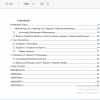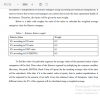Тема: IMPACT OF ECONOMIC SANCTIONS ON THE FINANCIAL PERFORMANCE OF A COMPANY: HUAWEI CASE
Закажите новую по вашим требованиям
Представленный материал является образцом учебного исследования, примером структуры и содержания учебного исследования по заявленной теме. Размещён исключительно в информационных и ознакомительных целях.
Workspay.ru оказывает информационные услуги по сбору, обработке и структурированию материалов в соответствии с требованиями заказчика.
Размещение материала не означает публикацию произведения впервые и не предполагает передачу исключительных авторских прав третьим лицам.
Материал не предназначен для дословной сдачи в образовательные организации и требует самостоятельной переработки с соблюдением законодательства Российской Федерации об авторском праве и принципов академической добросовестности.
Авторские права на исходные материалы принадлежат их законным правообладателям. В случае возникновения вопросов, связанных с размещённым материалом, просим направить обращение через форму обратной связи.
📋 Содержание
INTRODUCTION 8
1. Methodology for evaluating of a company's financial performance 10
1.1 Accounting Performance Measurement 10
1.2 Relative Valuation Model as a tool to estimate company’s financial performance 13
2. Case Description 18
2.1 Company’s Description 18
2.2 Analysis of sanctions to Huawei 19
2.3 Market Analysis 21
3. Estimation of Huawei’s Performance 26
3.1 Accounting Performance Review 26
3.2 Huawei performance review: Relative Valuation Model 32
CONCLUSION 42
REFERENCES 44
APPENDIX 1 47
APPENDIX 2 49
APPENDIX 3 50
APPENDIX 4 51
📖 Введение
The trade war between the U.S. and China, which has resulted in sanctions against Huawei in particular, is the most obvious consequence of de-globalization. This paper will analyze the effects of sanctions on Huawei, targeting Huawei's consumer and carrier divisions. Huawei is one of the leaders in the field of wearable electronics. In addition, the company is a world leader in the telecommunication equipment market. Moreover, Huawei is the leading manufacturer of 5G equipment. In 2019, the company has 91 contracts to supply 5G equipment around the world, more than any other telecommunications company, (Reuters 2020).
This paper describes the problem of estimating the impact of economic sanctions on the company. Of course, it can be assumed that the sanctions will cause a decrease in revenue, a decrease in market share in any sector. However, a preliminary analysis of the data makes it possible to assert that the impact of the sanctions on the company's activity is not so unambiguous.
Huawei's share of the communications equipment market decreased insignificantly, the company did not lose its leading position. The company's revenue declined, but the company's 2021 operating revenues increased by more than 60% and cash flow from operating activities by 70% in comparison with 2020. These examples show that the company's management made decisions that helped minimize the costs of sanctions, (Huawei Investment & Holding Co. Ltd. 2022).
The research goal is to estimate the impact of sanctions on the financial performance of Huawei, both at the level of the company as a whole, and at the level of individual business segments.
The topic of this article is very relevant in today's geopolitical environment. A number of sanctions have been imposed on many Russian companies, including in the information technology sector. Despite the fact that Huawei is a unique company, the analogues of which are quite difficult to find, Huawei's experience in overcoming the sanctions pressure may be useful for Russian companies. In addition, there is currently no suitable analysis of the impact of sanctions on Huawei's financial performance, not only in general, but also in the context of the company's key business segments. Thus, this master's thesis can offer such a scientific analysis.
This primary goal can be achieved through the following specific objectives:
1. Estimate the impact of sanctions on the company's financial performance using the accounting ratios method.
2. Estimate the impact of the sanctions on the company key business segment’s financial performance using relative ratios.
The thesis describes the main methods for assessing the financial performance of the company. A comparison of the financial performance of the company in comparison with the indicators of the previous year and in comparison with peer-companies is carried out.
The first chapter reviews the theoretical foundations of accounting performance measurement and relative ratios method.
The second chapter discusses the ownership and management structure of the company, the company's share in key markets, and analyzes the sanctions that have been imposed on the company.
The third chapter presents an analysis of the current financial position of the company, calculations of the company's financial ratios based on the methods of accounting ratios and concrete business segment enterprise value calculations using relative ratios approach.
✅ Заключение
The study was primarily driven by the following factors:
1. Acceleration of tendencies of de-globalization and, as a consequence, strengthening of trade confrontation between countries
2. Increased sanctions pressure not only on companies from China but also on a number of Russian companies. The need to adopt the successful experience of doing business under sanctions pressure.
3. The need to make an objective estimation of the company's financial performance under the sanctions.
The thesis estimated the impact of sanctions on the company as a whole, as well as on its main divisions. Based on the results of the work, we can conclude that the impact of the sanctions was quite ambiguous.
Huawei's financial results were significantly better than those of ZTE, which was under similar sanctions pressure. This means that, all other things being equal, the company's management managed to maintain the stability of a number of business processes. The company manages to keep its margins at the level of peer companies due to a successful policy of cost reduction.
Compared to other similar companies, we can observe a significant decrease in the key profitability indicators - ROE and ROA (more than twice), which is caused by a high level of investment in R&D. However, the gross and net margins have not only recovered to pre-crisis levels, but also surpassed them. However, the company is experiencing a prolonged negative trend related to sales of finished products. This is evidence of the breakdown of previous supply chains, related both to the Covid-19 pandemic and directly to the sanctions.
The relative ratios method was used to estimate the impact of sanctions on the key segments of the company. Based on this method, the dynamics of Enterprise value of two key segments of the company was calculated compared with the average value of peer companies. On the basis of the data obtained, the conclusion was made that the most affected segment was the Consumer segment.
Enterprise value of Consumer segment not only decreased significantly, but also had the opposite trend from the market. Despite the fact that the company is taking steps to restore the business: for example, by increasing investment in the development of its own software or concluding agreements with licensors of processor architecture, there are no grounds to expect the recovery of Enterprise value at least to pre-crisis values.
To reduce the effect of sanctions, the company's management has taken several steps, the most important of which were: the issue of bonds worth $470 million and it will increase the company's total debt in 2022 to 17 billion yuan ($2,6 billion) from 11 billion yuan ($1,7 billion) last year and 9 billion yuan ($1,4 billion) in 2020. Also company sold one of the key branches of the consumer electronics segment - the Honor brand, to increase its cash. Now Honor separately generates about $20 billion annually. That is more than half of the consumer electronics segment's 2021 revenue. The first and second steps, while having short-term positive effects, will have significant long-term consequences that will lead to both increased leverage and reduced revenues.
The segment of telecommunications equipment, although, formally, was a direct target of sanctions, but did not suffer significantly. The estimated value of this segment maintained market dynamics and even surpassed it in 2021. Assumed EV increased by 46% compared to 2020. Moreover, the company is still the world leader in the telecommunications equipment market.
To summarize, it can be said that, at first glance, the impact of sanctions on the financial performance of the company was not significant. However, despite the steps that made it possible to maintain the short-term sustainability of the financial results, there are reasons to believe that the long-term effect of the sanctions will be much more significant. If the sanctions pressure continues, that the company's Consumer segment will generate less and less profit. The decline in profits will not be able to be offset by the growth in profits of the Carrier segment. Which could lead to a reduction in R&D expenditures and, as a consequence, a decrease in the company's share of the telecommunications equipment market. The Consumer segment has a higher margin than the Carrier segment and requires significantly less investment in R&D. Therefore, a decline in revenue from the Consumer segment could be a serious problem in the future.
From a practical point of view this thesis can be used in several cases. First, the analysis of the impact of sanctions on Huawei can be used to make decisions on the purchase of the company's corporate bonds. Secondly, Huawei's competitors can use the thesis to assess the company's development prospects under sanctions pressure. Thirdly, such an analysis can be used as an example of a successful case study of overcoming sanctions for Russian companies (especially in the IT sphere).





